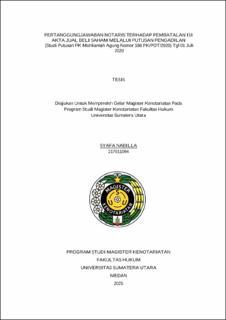| dc.description.abstract | This research discusses the function of preliminary contract. In principle, a contract becomes a legal certainty which can provide justice for the parties in the Deeds Numbers 14, 15, and 59, made by Defendant VI in the Bekasi District Court Verdict No. 334/Pdt.G/2014/PN.Bks. Unfortunately, there is an indication of only pro forma (pretension) of one of the parties in the contract so that it can have implication on the revocation of the Notarial deed by the Court because of the illegal offense committed by one of the parties which harm another party. Legal theory used in the analysis in this research is liability, legal protection, and legal certainty.
The research problems are as follows: how a Notary's liability for stock transaction certificate made by him and revoked by the Court, how about the legal protection for the harmed party because of the revocation of stock transaction certificate by the Court, and how about the juridical analysis used by the judge in revoking per forma stock transaction certificate in the Supreme Court Ruling No. 188 PK/PDT/2020.
The research uses juridical normative with case approach by analyzing the case in the Bekasi District Court Verdict No. 334/Pdt.G/2014/PN.Bks, the Bandung Higher Court Verdict No. 467/PDT/2016/PT.Bdg, the Supreme Court Ruling No. 1681 K/Pdt/2017, and the Supreme Court Ruling No. 188 PK/Pdu/2020. The source of data is secondary data obtained from primary, secondary, and tertiary legal materials. They are gathered by conducting library research and analyzed qualitatively.
The result of the research suggests that a Notary usually gets difficulty in monitoring and detecting a pro forma stock transaction; even though he has done prudential principles, one of the parties can possibly have bad faith and harm another party so that the harmed party will file a complaint to the court and make the Notary as the defendant. However, in the case of in the Bekasi District Court Verdict No. 334/Pdt.G/2014/PN.Bks, the Bandung Higher Court Verdict No. 467/PDT/2016/PT.Bdg, the Supreme Court Ruling No. 1681 K/Pdt/2017, and the Supreme Court Ruling No. 188 PK/Pd/2020, the Notary who has filed judicial review is found not guilty and not be burdened with collective responsibility even though the notarial deed is revoked since he only makes the deed and one of the parties has bad faith. Therefore, the preliminary agreement in this case cannot be categorized as the preliminary agreement which has been revoked by the Court. | en_US |


